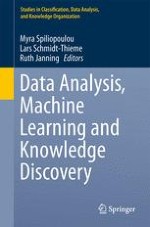2014 | OriginalPaper | Buchkapitel
Comparing Regression Approaches in Modelling Compensatory and Noncompensatory Judgment Formation
verfasst von : Thomas Hörstermann, Sabine Krolak-Schwerdt
Erschienen in: Data Analysis, Machine Learning and Knowledge Discovery
Aktivieren Sie unsere intelligente Suche, um passende Fachinhalte oder Patente zu finden.
Wählen Sie Textabschnitte aus um mit Künstlicher Intelligenz passenden Patente zu finden. powered by
Markieren Sie Textabschnitte, um KI-gestützt weitere passende Inhalte zu finden. powered by
